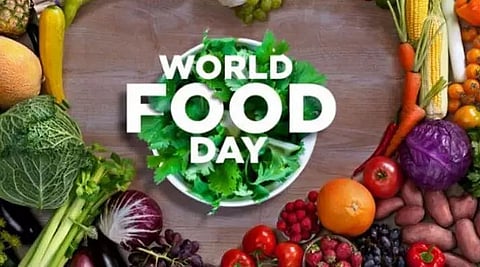
- Home
- Live Blog
- Breaking News
- Top Headlines
- Cities
- NE News
- Sentinel Media
- Sports
- Education
- Jobs

Ranjan K Baruah
(With direct inputs from UN publication and feedback may be sent to bkranjan@gmail.com)
The recent pandemic has proved and taught us one of the basic lessons of life. The pandemic taught us that we can live without luxury but we cannot sustain without food. Even in lockdown time we saw how food and eatable supply were part of essential services apart from medicines. Poor people struggle for food and waste are done by people who can afford to buy more and more food. There are around 2 billion people who experience moderate or severe food insecurity, meaning they have difficulty in regularly accessing enough nutritious food around the world. More than 113 million people across 53 countries experience acute hunger requiring urgent food, nutrition and livelihoods assistance.
We are aware that the global population is expected to reach almost 10 billion by 2050, which will significantly increase the demand for food. Approximately 14 per cent of food produced for human consumption is lost each year before reaching the wholesale market. Smallholder farmers need greater access to finance, training, innovation and technology to improve their livelihoods but irony is that internet services are not accessible to all of them. The biggest challenge is that intensified food production, combined with climate change, is causing a rapid loss of biodiversity.
A combination of poor diets and sedentary lifestyles has led to soaring obesity rates, not only in developed countries, but also low-income countries, where hunger and obesity often coexist and if our food systems are not transformed, undernourishment and malnutrition will greatly increase by 2050. This could increase more if there is further deterioration in income inequality, employment or basic access to services.
World Food Day (WFD) is calling for global solidarity to help all populations, and especially the most vulnerable, to recover from the crisis, and to make food systems more resilient and robust so they can withstand increasing volatility and climate shocks, deliver affordable and sustainable healthy diets for all, and decent livelihoods for food system workers. WFD is organised around the world on 16th October. Collective action across 150 countries is what makes WFD one of the most celebrated days of the United Nations' (UN) calendar. Hundreds of events and outreach activities bring together governments, businesses, non-governmental organizations (NGOs), the media, and general public. It marks the 75th anniversary of the Food and Agriculture Organization of the United Nations (FAO) in an exceptional moment as countries around the world deal with the widespread effects of the COVID-19 pandemic.
Though there is self sufficiency in food productions, we need new technologies which shall promise revolutionary changes for smallholder farmers. These include satellite imaging, remote sensing and mobile and block chain Apps with the potential to optimize food chains, increase access to nutritious foods, reduce food loss and waste, improve water management, fight against pests and diseases, monitor forests or prepare farmers for disasters. Farmers can be trained and best practises with climate friendly styles can be adopted. We must remember that we have to produce sufficient food but in a sustainable way so that climate changes can be mitigated.
We all have a role to play, from increasing the overall demand for nutritious food by choosing healthy, to not letting sustainable habits fall by the wayside, despite these uncertain times. The roles of different players are different and all of us must play our role positively. Let us respect a farmer who produces food for us by not wasting the food and paying right prices for what we buy and eat. Let us not forget that food is the essence of life and the bedrock of our cultures and communities. Preserving access to safe and nutritious food is and will continue to be an essential part of the response to the COVID-19 pandemic, particularly for poor and vulnerable communities. Let us become champions and contribute positively by encouraging farmers and not wasting any food material. Let us not forget that our actions are our future.